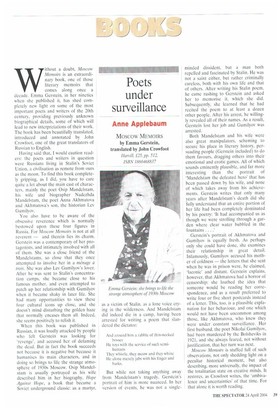Poets under surveillance
Anne Applebaum
MOSCOW MEMOIRS by Emma Gerstein, translated by John Crowfoot Harrill, £25. pp. 512, ISBN 1860468837 lyvithout a doubt, Moscow Memoirs is an extraordinary book, one of those literary memoirs that comes along once a decade, Emma Gerstein, in her nineties when she published it, has shed completely new light on some of the most important poets and writers of the 20th century, providing previously unknown biographical details, some of which will lead to new interpretations of their work. The book has been beautifully translated, introduced and annotated by John Crowfoot, one of the great translators of Russian to English.
Having said that. I would caution readers: the poets and writers in question were Russians living in Stalin's Soviet Union, a civilisation as remote from ours as the moon. To find this book completely gripping, as I did, you have to care quite a lot about the main cast of characters, mainly the poet Osip Mandelstam, his wife and biographer Nadezhda Mandelstam, the poet Anna Akhmatova and Akhmatova's son, the historian Lev Gumilyov.
You also have to be aware of the obsessive reverence which is normally bestowed upon these four figures in Russia. For Moscow Memoirs is not at all reverent — and therein lies its charm. Gerstein was a contemporary of her protagonists, and intimately involved with all of them. She was a close friend of the Mandelstams, so close that they once attempted to involve her in a menage a trots. She was also Lev Gumilyov's lover. After he was sent to Stalin's concentration camps, she became close to his famous mother, and even attempted to patch up her relationship with Gumilyov when it became shaky in later life. She had many opportunities to view these four cultural icons up close, and she doesn't mind disturbing the golden haze that normally encases them all. Indeed, she seems positively to relish it.
When this book was published in Russian, it was loudly attacked by people who felt Gerstein was looking for 'revenge', and accused her of defaming the dead. But in fact the book succeeds not because it is negative but because it humanises its main characters, and in doing so brings to life the strange atmosphere of 1930s Moscow. Osip Mandelstam is usually portrayed as his wife described him in her biography, Hope Against Hope, a book that became a Soviet underground classic: as a martyr, Emma Gerstein: she brings to life the strange atmosphere of 1930s Moscow as a victim of Stalin, as a lone voice crying in the wilderness. And Mandelstam did indeed die in a camp, having been arrested for writing a poem that slandered the dictator:
And around him a rabble of thin-necked bosses He toys with the service of such semihumans They whistle, they meow and they whine He alone merely jabs with his flinger and barks.
But while not taking anything away from Mandelstam's tragedy, Gerstein's portrait of him is more nuanced. In her version of events, he was not a single
minded dissident, but a man both repelled and fascinated by Stalin. He was not a saint either, but rather criminally careless, both with his own life and that of others. After writing his Stalin poem, he came rushing to Gerstein and asked her to memorise it, which she did. Subsequently, she learned that he had recited the poem to at least a dozen other people. After his arrest, he willingly revealed all of their names. As a result, Gerstein lost her job and Gumilyov was arrested.
Both Mandelstam and his wife were also great manipulators, scheming to secure his place in literary history, persuading people (Gerstein included) to do them favours, dragging others into their emotional and erotic games. All of which sounds eminently plausible, and far more interesting than the portrait of `Mandelstam the defeated hero' that has been passed down by his wife, and none of which takes away from his achievements. Gerstein writes that only many years after Mandelstam's death did she fully understand that an entire portion of her life had been completely dominated by his poetry: 'It had accompanied us as though we were strolling through a garden where clear water bubbled in the fountains.
Gerstein's portrait of Akhmatova and Gumilyov is equally fresh. As perhaps only she could have done, she examines their relationship in great detail. Infamously, Gumilyov accused his mother of coldness — the letters that she sent when he was in prison were, he claimed, 'laconic' and distant. Gerstein explains, however. that Akhmatova had a horror of censorship: she loathed the idea that someone would be reading her correspondence, and as a result preferred to write four or five short postcards instead of a letter. This, too, is a plausible explanation for her behaviour, and one which would not have been uncommon among those, like Akhmatova, who knew they were under constant surveillance. Her first husband, the poet Nikolai Gumilyov, had been murdered by the Bolsheviks in 1921, and she always feared, not without justification, that her turn was next.
Moscow Memoirs is stuffed full of such observations, not only shedding light on a peculiar historical moment, but also describing, more universally, the impact of the totalitarian state on creative minds. It restores, as Crowfoot writes, the 'ambivalence and uncertainties' of that time. For that alone it is worth reading.


















































































 Previous page
Previous page